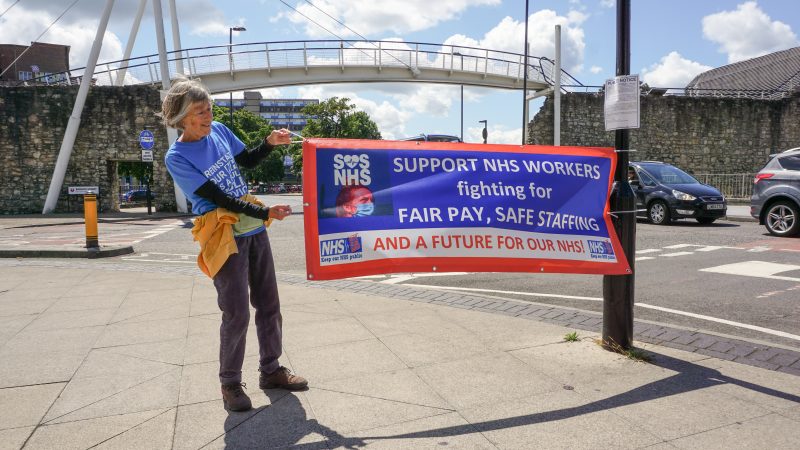Mike Phipps reviews The Department: How a Violent Government Bureaucracy Killed Hundreds and Hid the Evidence, by John Pring, published by Pluto.
October 9, 2024
As John McDonnell MP points out, this book provides “definitive proof of how government austerity hasn’t just harmed disabled people, it has killed them.”
It has taken over a decade of research by disabled journalist John Pring, who is founder and editor of the Disability News Service, to uncover the hundreds of deaths of disabled people resulting from the slow, bureaucratic violence inflicted on them by those running the UK’s benefits system. The individual stories of the suicides and deaths by starvation and other causes that Pring includes in the book are utterly harrowing.
First victims
When did the deliberate targeting of disabled claimants start? Pring starts his story in the late 1980s when the then Department for Social Security begins to deliberately brief the media about ‘workshy’ disabled claimants in preparation for a harsher benefits regime.
The change comes in the early 1990s. The government plans to cut the benefits bill by bypassing the claimant’s GP and using their own doctors from the Benefits Agency – “an objective medical test”. Henceforth the insurance industry, and other parts of the private sector, will gain an increasingly tight grip on disability assessments. The aim is to make about 20% of those who previously qualified for benefit ineligible under the new regime.
One victim of this reform was David Holmes, a man who had suffered a massive heart attack in 1982 and been awarded a lifetime mobility pension. Under the new rules, he was seen by a DSS doctor for 40 minutes and assessed as fit for work, his benefits ended. When he collapsed and died a few weeks later, he hadn’t even had time to post his appeal to the Department, explaining that on some days he struggled for breath getting out of bed. The local paper ran the story under the headline “Worried to Death”.
The minister responsible said that cases of this kind were isolated. In fact, a 1997 report found that, of the 60% of claimants who appeal against being disallowed benefit, more than half have it reinstated on appeal.
New Labour makes it tougher
A change in government brings no respite. To cut the benefits bill, New Labour outsources the assessment process to a private company. Reflecting the new ‘work ethic’, intensified job-search requirements are imposed – alongside tougher sanctions.
In May 1998, the government faces a significant, but unsuccessful, backbench rebellion, over its plans to means-test and tighten access to incapacity benefit. Despite the absence of evidence, a widespread belief in claimants’ malingering and propensity to fraud remains embedded in the Department and the private sector companies it works with.
From 2005 to 2007, the Secretary of State for the Department for Work and Pensions is John Hutton, who is later elevated to the House of Lords, works for the nuclear industry and takes a job with the Tory-led Coalition examining public sector pensions. While DWP head, he absurdly claims that “the vast majority” of people on incapacity benefit want to work – in fact, most know they are simply unable to do so.
Hutton proposes to cut the number of incapacity benefit recipients by a million over a decade. One of the experts who works on the Department’s attempts to fine-tune its plan later describes it as “reckless”. He tells the author that “everybody thought” the reforms would harm claimants and were simply about cost-cutting.
The Tories and most of the media – the Guardian included – appear to be in lockstep with this approach. By the time Labour leaves office, a Citizens Advice report finds that “high numbers” of seriously ill and disabled people are being found fit for work. Pring documents some of the tragedies that result from this – and the ensuing rise in disability activism.
The austerity Coalition
During the Coalition, it is these activists who raise the alarm about the harm the DWP is causing – the distress, self-harm, suicide attempts and hospitalisations that occur in anticipation of claimants being reassessed. But in 2012 the Welfare Reform Act introduces universal credit, the bedroom tax and a new disability benefit that ministers hope will cut spending by 20% in that area.
As media reports about disability benefit fraud more than double between 2005 and 2011, a crossbench peer tells Parliament that disabled people are now facing public hostility, with strangers accosting them and accusing them of faking their disability. Meanwhile, Shadow Work and Pensions Secretary Rachel Reeves announces Labour will be tougher on welfare than the Coalition.
As the deaths of people wrongly found fit for work mount up, the DWP denies – falsely – that it keeps records of these. The author concludes that the Department is doing everything possible to prevent the fatal consequences of its assessments being made public.
The dire quality of assessment interviews is an important feature of the author’s research. One man, Michael O’Sullivan, who suffered from extreme anxiety, panic attacks and depression, is declared fit for work after a twelve-minute assessment by a physiotherapist – because by now you don’t have to be a doctor to carry out these vital assessments. Later Michael says he was left “humiliated… feeling like a criminal.” He is called for another test four months later, at which the doctor, from the private contractor Atos, who also finds him fit for work, subsequently admits – at the inquest following Michael’s suicide – that he had not asked him if he had suicidal thoughts because he “looked OK.” This was despite Michael declaring in his pre-assessment form that he had indeed had such thoughts.
These are not isolated cases. Public health research shows that across England the reassessment of incapacity benefit claimants between 2010 and 2013 was “associated with” an extra 590 suicides.
Tories turn the screw
Meanwhile the Tory government cuts disabled people’s benefits again in 2016. Furthermore, new guidance to Maximus, the contractor which replaces Atos, makes it harder for claimants who are at significant risk of harm because of their mental health to avoid work-related activity.
In 2018, research from Essex University finds that the system of sanctions imposed on disabled people, including having their benefits cut for weeks, is “psychologically toxic”, “incoherent”, “arbitrary” and causes “a state of almost constant anxiety”. The DWP announces plans for a review of its sanctions policy – which it later scraps. Further research in 2021 shows how the Department inflicts psychological harm on claimants, imposes unofficial sanctioning targets and pushes disabled people into work despite the risks to their health.
In 2018, Roy Curtis, who suffered from chronic depression, panic attacks and Aspergers Syndrome, publicly posts online his intention to kill himself because he no longer has the energy to fight the DWP who have cut off his benefits. Although they are subsequently reinstated, he is then called in for a further face-to-face assessment, in a letter automatically generated by the Department’s IT system. A few days later Roy commits suicide. Without visiting his flat, social workers close his case. His benefits are stopped; so is his rent. Only when bailiffs break in nine months later to evict him is his body discovered. At his inquest nobody from the DWP or Maximus give evidence.
The idea that lessons might be learned so that such tragedies are not repeated is contradicted by the evidence of further deaths. This book documents a consistent refusal by the Department to take any notice of either the tragic deaths caused by its vicious policies, or the academic findings that systematically criticise them.
On the contrary, by 2023 the Conservatives are proposing to allow jobcentre staff with no medical qualifications to decide whether disabled people are able to carry out work-related activity. How far this mentality will change under a Labour government remains to be seen.
Accountability thwarted
There are many villains that emerge from Pring’s work, in all governing parties. But one who deserves special mention is Iain Duncan Smith, who presided over the DWP from 2010 to 2016, introducing Universal Credit, the Work Programme and real-terms benefit cuts. It was under him that the Department employed debt collectors to retrieve overpaid benefits and tried to introduce retrospective legislation to re-establish the legality of its ‘workfare’ policy after it was overturned in the courts – which itself was in breach of the European Convention on Human Rights. And it was under him that statistics showed 2,380 people died in a three-year period shortly after a work capability assessment declared them fit for work – which led Jeremy Corbyn MP rightly to call for his resignation. TheIndependent newspaper recently highlighted eleven ways Iain Duncan Smith made life harder for the most vulnerable people in Britain.
During the 2024 general election campaign, I went to Chingford to support local Labour activist Faiza Shaheen in her effort to unseat local MP Iain Duncan Smith, whom she had come close to defeating in 2019. I was not alone. Supporters of disability rights had travelled from far afield to help bring down this perpetrator of so much misery.
Two days later, mid-campaign, Faiza Shaheen was removed as Labour’s candidate in one of the most unpleasantly factional manoeuvres of the entire Starmer leadership. The Labour apparatus’s parachuting in of a careerist replacement with no connection to the area helped this much-detested Tory get re-elected.
John Pring has written a hugely important book which highlights a neglected national scandal. A copy has been delivered to every MP – let’s hope they read it!
John Pring writes about his book for Labour Hub here.
Mike Phipps’ book Don’t Stop Thinking About Tomorrow: The Labour Party after Jeremy Corbyn (OR Books, 2022) can be ordered here.
 Janusz Pienkowski / Shutterstock.com
Janusz Pienkowski / Shutterstock.com








